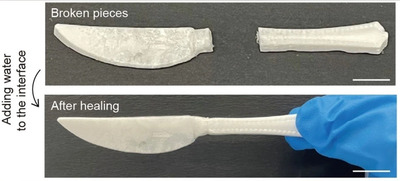Eco-friendly bioplastic degrades in just 29 days

In an effort to reduce plastic pollution and promote environmental sustainability, an international research team from Hong Jong, Israel, Singapore and the USA has developed a new type of biodegradable and recyclable bioplastic material based on DNA–polysaccharide hydrogels derived from natural plant and biological waste sources. As durable as conventional plastics, the bioplastic is water-resistant and can be processed into sturdy sheets or pellets. It has been described in the journal Nature Communications.
In soil-based simulation experiments, spoons made from the new bioplastic and conventional polyethylene (PE) were buried under ambient soil conditions and completely degraded in as little as 29 days (driven by natural soil microorganisms), leaving behind only water and carbon dioxide; in comparison, traditional PE spoons remained intact. Tests have also confirmed that the bioplastic’s molecular structure is biocompatible, dissolves under specific conditions for recycling, and remains stable when exposed to common organic solvents such as oils, alcohol and detergents, ensuring safe everyday use.
Moreover, the bioplastic demonstrates a self-healing function. Experiments show that minor scratches or cracks on its surface can repair themselves when a little water is added at room temperature, restoring the original molecular structure and load-bearing capacity without heating or chemical treatment. Unlike commercially available biodegradable plastics such as polylactic acid (PLA), which require industrial composting and yield mixtures unsuitable for recycling into new plastics, this new material is said to be truly recyclable.

Another significant advancement is the extremely low microplastic residue generated during degradation. Animal experiments have confirmed no detectable microplastic accumulation in vivo, suggesting the material can effectively address one of the most challenging global environmental issues of our time. The study thus provides a solution that accelerates plastic recycling, reduces carbon emissions, and minimises secondary environmental and human health impacts.
“Most commercial plastics are derived from non-renewable fossil fuels, contributing to carbon emissions and environmental burden,” noted first author Ke Yujie, Assistant Professor at Lingnan University’s School of Interdisciplinary Studies (SIS). “Our bioplastic is a sustainable alternative with a much lower carbon footprint.
“We aim to introduce eco-friendly shopping bags in the retail sector, which, coupled with recycling and reuse, should considerably alleviate landfill pressure in Hong Kong. We are also exploring applications with international partners in food packaging, logistics and agriculture, aiming to gradually replace conventional plastics and contribute to a zero-plastic future for global sustainable development.”
Corresponding author Chen Xi, Dean of SIS and Chair Professor of Interdisciplinary Studies at Lingnan University, added, “This new material is not limited to shopping bags; it has potential applications in other plastic products, including disposable tableware. Its molecular structure can also be precisely engineered at the nanoscale for micro-components in electronics or high-tech materials. In normal use, it does not dissolve in water, and when recycled and exposed to specific enzymes, it can fully degrade in as little as 120 minutes. We believe this innovative material is a scientific breakthrough that will reduce plastic impact at source.”
Colon cancer DNA in blood can guide chemo decisions
A simple blood test could change how doctors decide which patients with colon cancer need...
Non-invasive blood test helps rule out oesophageal cancer
Designed and developed in Australia, the PromarkerEso test is designed to offer a quick,...
Taste-based flu test enables rapid diagnosis
The diagnostic tool consists of the sensor molecule thymol and a virus-specific sugar building...



